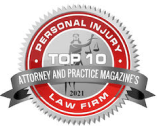In Connecticut, victims of car accidents can sue for the full extent of their economic damages without facing a legal cap. This means that victims can potentially receive compensation for all of their financial losses resulting from the accident, including medical bills, lost wages, and property damage.
However, there are certain factors that can impact the amount of compensation a victim may receive in an auto accident lawsuit, and there is no specific limit to how much you might receive.
Below, we’ll discuss these factors and how they can affect the potential amount of a car accident settlement in Connecticut.
What are the factors that influence compensation amounts?
The compensation a car accident victim in Connecticut can receive is influenced by a multifaceted set of factors.
Below is a table that breaks down some of the key factors that may impact a car accident lawsuit settlement in Connecticut:
- Severity of Injuries: The more severe the injuries, the higher the potential compensation. Considerations include extensive medical treatment, rehabilitation, and long-term disabilities.
- Impact on Quality of Life: Compensation is affected by how injuries impact quality of life, including pain and suffering, loss of enjoyment of life, and inability to engage in activities.
- Amount of Economic Loss: Includes quantifiable financial losses such as medical expenses, lost earnings, and property damage.
- Comparative Negligence: The payout amount may be reduced if victim is partially at fault, with recovery barred at 51% fault or higher.
- Availability of Insurance Coverage: Settlement amount is influenced by the at-fault party’s insurance policy limits; low limits or limited personal assets can hinder obtaining full compensation.
Note that while these factors may be common across most car accident cases, each case is unique and may involve additional factors that can influence the amount of compensation received. For example, if the victim has a pre-existing medical condition that was worsened by the accident, this could also impact the settlement amount.
An experience Hartford car accident attorney from our law firm will take all of these factors into account when negotiating with insurance companies and seeking a fair settlement for their client. We will also be prepared to go to trial if necessary, to fight for the maximum possible on your behalf.

Types of damages: what can you sue for in a car accident?
Legal damages are categorized into three main types: economic, non-economic, and punitive damages. Each of these categories plays a crucial role in the overall compensation process, addressing different facets of the victim’s losses and suffering.
If you’re more interested in specific amounts, check out our dedicated guide on the average car accident settlement in Connecticut.
Economic damages
Economic damages refer to the tangible, out-of-pocket expenses that can be easily quantified. This includes:
- Medical expenses
- Lost wages due to an inability to work
- Rehabilitation costs
- Property damage.
These damages are typically substantiated by bills, receipts, and employment records, making them more straightforward to calculate and claim.
Non-economic damages
Non-economic damages cover the intangible losses suffered by victims, which are not easily quantified. These include:
- Pain and suffering
- Emotional distress
- Loss of companionship
- The overall impact on the victim’s quality of life
Unlike economic damages, calculating non-economic damages is more subjective and requires careful consideration of the individual circumstances of each case.
Punitive damages
Punitive damages are not directly related to the victim’s losses but are rather intended to punish the offender and deter future negligent or malicious actions. In Connecticut, punitive damages can be awarded in cases where the defendant’s behavior is found to be especially reckless or egregious.
For example, if the at-fault driver was under the influence of drugs or alcohol at the time of the accident, punitive damages may be awarded to punish their reckless behavior and discourage others from doing the same.
However, it’s important to note that punitive damages are awarded at the court’s discretion and are not as commonly granted as economic and non-economic damages.
Additional reading: who pays for medical bills after a car accident
Who gets sued in a car accident
In most incidents, the at-fault driver is typically the one who gets sued. This means that they are held legally responsible for compensating the victim for their losses and suffering. However, there are also situations where parties other than the at-fault driver may be sued:
- The owner of the vehicle: If the at-fault driver was driving a vehicle owned by someone else, such as a friend or family member, the owner may also be held liable for damages.
- The employer of the at-fault driver: If the accident occurred while the at-fault driver was on the job, their employer may also be sued.
- Government entities: In some cases, the government may be held liable, such as if poor road conditions or faulty traffic signals contributed to the crash.
- Manufacturers: If an accident is caused by a defective vehicle part, the manufacturer of that part may be sued for damages.
Additional reading: can you sue someone for reckless driving
The role of comparative negligence in Connecticut
Connecticut follows a modified comparative negligence rule, which plays a significant role. This rule stipulates that a victim’s compensation is reduced by their percentage of fault in the accident. However, it also states that if a victim is found to be more than 50% at fault, they are not eligible to receive any compensation from the other parties involved in the accident.
For instance, if a court finds that a victim was 30% at fault for the accident and the total damages amount to $100,000, the victim’s compensation would be reduced by 30% (or $30,000), resulting in an award of $70,000. This rule emphasizes the importance of establishing the degree of fault among all parties involved in an accident.
Legal representation can be vital in navigating the complexities of comparative negligence, ensuring that victims receive a fair assessment and are compensated appropriately for their losses. Similarly, they can block the attempts of insurance companies and other parties to shift excessive blame onto victims and minimize their compensation.
Additional reading:
Factoring in insurance laws
Insurance plays a significant role, affecting the amount victims can recover. This section will explore two critical aspects related to insurance: underinsured and uninsured drivers. Both scenarios present unique challenges and considerations.
Underinsured drivers
When the at-fault driver’s insurance coverage is insufficient to cover the total damages suffered by the victim, this situation involves an underinsured driver. In such cases, the victim may turn to their own insurance policy’s underinsured motorist coverage to make up the difference.
However, negotiating these claims can be complex, requiring a clear understanding of both the policy details and the legal standards in Connecticut. For example, in Connecticut, the victim must first exhaust the at-fault driver’s insurance coverage before turning to their own policy. Additionally, they must prove that their damages exceed the limits of the at-fault driver’s policy.
Uninsured drivers
Uninsured drivers pose a significant challenge, as they do not have any insurance coverage to pay for the damages. Victims may still have recourse through their own insurance policies, specifically through uninsured motorist coverage. This coverage is designed to protect victims in accidents caused by drivers who lack the necessary insurance.
Navigating a claim against an uninsured driver often entails dealing with one’s own insurance company, which can include negotiations that are as challenging as those with third-party insurers. Victims may need to provide evidence of their damages and work with an attorney to ensure they receive appropriate compensation from their insurance company.
Additional reading: should I hire an attorney for a minor car accident?

The process for suing the responsible parties
Suing someone for a car accident in Connecticut involves a few critical steps that must be carefully followed to ensure a successful legal process:
- Seek Medical Attention: Immediately after the accident, prioritize your health and safety by getting medical treatment. This will also provide a record of your injuries.
- Document the Accident: Collect as much information as possible at the accident scene. This includes taking photos, getting contact information from witnesses, and obtaining a copy of the police report.
- Notify Your Insurance Company: Inform your insurance provider about the accident without admitting fault or providing details that could be used against you.
- Consult with an Attorney: Contact a personal injury attorney who specializes in car collisions to discuss your options and whether pursuing legal action is advisable.
- File a Claim: Under the guidance of your attorney, prepare and submit a claim against the at-fault party’s insurance company. This claim should include evidence of fault and a detailed account of your damages.
- Negotiate a Settlement: Your attorney will negotiate with the insurance company on your behalf to reach a fair settlement.
- File a Lawsuit: If a settlement cannot be reached, your attorney will file a lawsuit in the appropriate Connecticut court. This initiates the litigation process.
- Discovery: Both parties exchange information and evidence during this pre-trial phase. Depositions and interrogatories may occur.
- Mediation or Arbitration: Before going to trial, both parties might attempt to resolve the case through mediation or arbitration.
- Trial: If mediation fails, the case will go to trial where both sides present their evidence. A judge or jury will make the final decision on compensation.
Following these steps with the assistance of a qualified attorney can significantly increase the chances of obtaining fair compensation for damages sustained in a car accident.
For more information on how to proceed with a car accident case, we recommend checking out our guide on what to do after a car accident that’s not your fault and is it worth hiring an attorney for a car accident. Both of these resources provide valuable insights and tips for navigating the legal process.
Need expert legal advice in CT?
If you’re dealing with the aftermath of an accident in Connecticut and need expert legal guidance to navigate the complex claims process, our firm is here to support you every step of the way.
Our experienced team specializes in car accident cases, offering personalized service to ensure you receive the compensation you deserve. We’re committed to providing clear, effective legal advice and powerful advocacy for our clients. Don’t wait to seek the help you need.
Contact Chambers Law today for a free consultation to discuss your case. Let us help you secure the maximum compensation for your losses. Call us at (860) 231-9535 to get started.
Key takeaways
Being injured in an accident can be a traumatic and overwhelming experience, but with the right legal support, victims can navigate the claims process and secure fair compensation for their losses.
By understanding the factors that impact how much can someone sue for a car accident, ensure you follow medical advice, gather evidence, and seek expert legal advice — that way, you can better your rights and receive justice.
Additional reading: Connecticut car accident statute of limitations
FAQs
Can I sue for a car accident if I was partially at fault?
Yes, individuals involved in a car accident retain the right to pursue litigation for damages, even if they share a portion of the blame, but only up to 50%. In these cases, the amount of compensation awarded will be reduced by the percentage of fault assigned to the victim.
How soon after a car accident should I consult an attorney?
It’s advisable to consult an attorney as soon as possible after a car accident, ideally within a few days. This ensures that your legal rights are protected, evidence is preserved, and you receive guidance on how to proceed with insurance claims and potential legal action.
How long does it take to settle a car accident lawsuit?
The duration of a car accident lawsuit settlement varies widely depending on the complexity of the case, the cooperation of the involved parties, and the court’s schedule. Generally, it can take anywhere from a few months to several years to reach an agreement or go to trial.
Will my car accident case go to trial?
While the majority of car accident cases are resolved through settlement negotiations outside of court, some do go to trial. Whether your case proceeds to trial depends on the willingness of both parties to reach a settlement and the complexity of the legal issues involved.
What does it cost to hire a car accident attorney?
Most car accident attorneys work on a contingency fee basis, meaning you only pay if they win your case. The typical fee is a percentage of your settlement or court award, usually ranging between 25% to 40%, with 33% being a common average. Always confirm the fee structure upfront.


